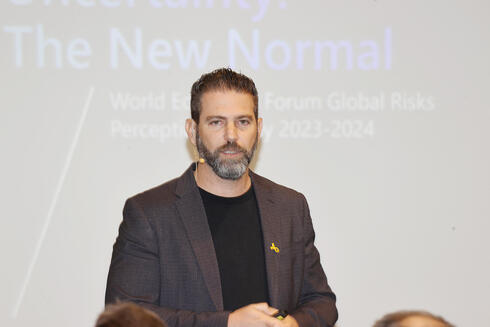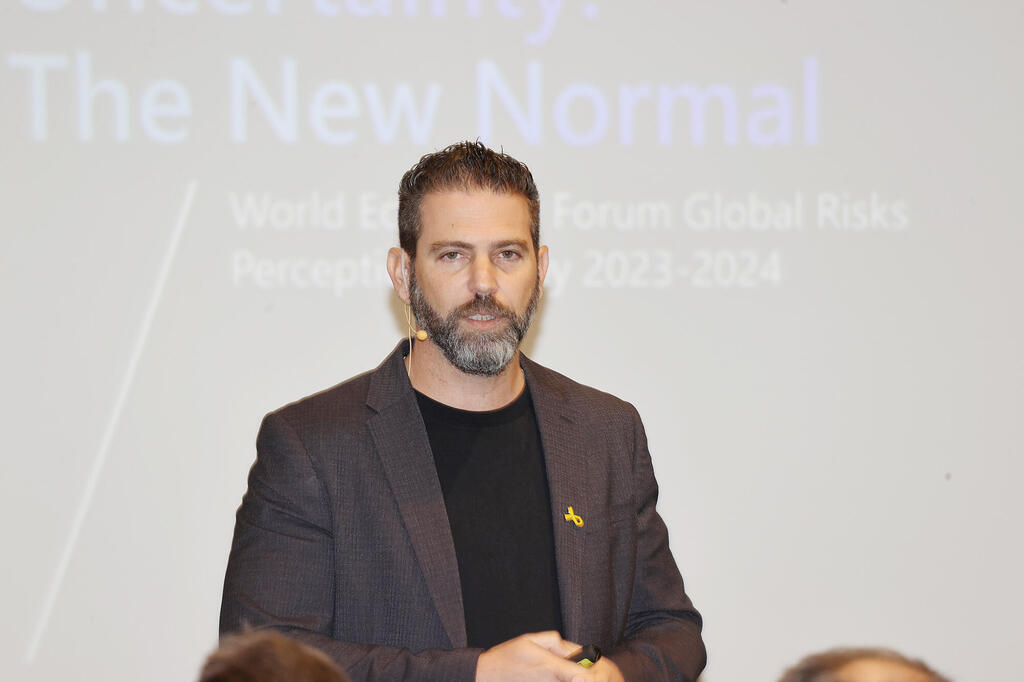
Microsoft Israel GM: "We are only in the very early stages of the AI revolution"
Alon Haimovich, Israel Country General Manager of Microsoft Israel spoke at Calcalist and Microsoft’s AIsrael conference about the tech industry’s responsibility to support the future of the country and how AI can be utilized in that regard.
"We have a shared responsibility for the future of the country and we must start speaking in a language of growth and leadership instead of just talking about resilience," said Alon Haimovich, the CEO of Microsoft Israel speaking at Calcalist and Microsoft’s AIsrael conference last week. Haimovich spoke about the upheavals Israel has experienced in the past four years, including COVID-19, which caused massive economic and societal damage, the global slowdown and inflation, the war between Russia and Ukraine, and October 7. "However, I'm not here to crush anyone," emphasized Haimovich, "the main idea is to look forward."
According to Haimovich, despite the challenges experienced by the local high-tech sector, it has managed to demonstrate significant business resilience in recent years: "This is reflected not only in the number of exits, but also in the continuation of foreign investments we have seen, and in international recognition," adding that "in the past six months since October 7, there has been over $3 billion of investment in Israel, cybersecurity companies raised over $1 billion, fintech companies raised half a billion dollars, and there were more than nine exits surpassing $100 million each. On the surface, these are impressive figures indicating business resilience," continued Haimovich. "But, is it enough? In my opinion, no. We do not want to remain focused on resilience but should return to a lens of growth and leadership in areas where we excel."
Haimovich spoke about the uncertainty in the current climate: "Uncertainty is the new normal. Not only because of the war and geopolitical conditions, but if we look at the recent World Economic Forum report, we see the major global risks that are expected to dictate our future in the coming decade – from risks brought by artificial intelligence, to cyberattacks, climate change, and more.
"The bottom line of the report from Microsoft OpenAI," continued Haimovich, "is that all of us together - global companies, established companies, and the tech sector - must take a collective stand. Only together will we succeed in dealing with these risks and achieving growth."
According to Haimovich, this focus on collective cooperation aligns with a strategy that Microsoft designed several years ago, which he calls the "growth triangle," and can be applied as a model to almost anything in conditions of uncertainty. "Firstly, we look at traditional industries because they define the problem – what challenge are we trying to solve to make breakthroughs – and that's one vertex of the triangle. Another idea is to seek partners and try to solve the challenge, but not just solve the problem in one area, but to turn the solution into leadership in that specific field."
Haimovich illustrated his point with the healthcare industry: "If, for example, we need a personalized medicine solution, then let's not just look for a specific solution but think about how to make the country a leader in personalized medicine. Microsoft will be the one to make the relevant connections and with interesting models and technology centered around artificial intelligence."
From there, Haimovich briefly touched on OpenAI's ChatGPT, stating that "it broke every possible record. Within two months, it reached 100 million users, and today, in April 2024, there are already 180 million subscribed users, with over 1.5 billion visitors alongside them. Everyone understands that AI presents us with endless opportunities, and now the question is what do we do with it in the context of growth?" According to Haimovich, "It seems like we're at the peak of the revolution, but we're far from it. We're at a very early stage. I really like to give the example of video, which started with tapes, then moved to discs, and now we have SORA – a technology launched by OpenAI that allows me to use the technology to make a video."
Haimovich pointed out that the main reason SORA has not yet been officially launched is the concern about its potential misuse: "Since October 7th, we have seen more cynical exploitation of artificial intelligence through video and Deep Fakes. Iranian manipulation has grown significantly, and we have seen the use of AI to influence public opinion, so Microsoft has not yet given approval to use SORA until we finish analyzing the risks." They are also seeking to implement SORA through the triangular model, says Haimovich. "Together with partners in the Tech Accord (an alliance signed by technology giants to prevent election fraud), we committed to integrating technological solutions to prevent the use of Deep Fakes in elections."
Haimovich gave several examples of using artificial intelligence to create breakthroughs in the healthcare system. "If we were to ask the healthcare system what challenge it wants to solve, the answer is probably to accelerate innovation and research in the field, but the reality is difficult. There is a shortage of 30 million nurses and doctors, which ultimately leads to patients being dissatisfied with their treatment experience."
According to Haimovich, AI provides fascinating solutions to the pressing shortage of human resources in the healthcare system. Among other things, he discussed patient monitoring, which includes their key metrics, such as heart rate and blood oxygen level. "AI enables us to understand the context and content of these metrics and to generate summaries of the insights derived from them in Hebrew."
"Take the overcrowded hospitals of October 7th," he continued. "Artificial intelligence allows something amazing - extracting insights from patients in real-time and providing initial diagnosis." Another use case Haimovich highlighted was organ transplants, especially during mass casualty incidents, with AI enabling the identification of vital organs and carrying them between hospitals.
At this point, Haimovich addressed the tech community and startup enthusiasts in the audience, explaining to them the value of implementing the company's growth triangle model. "You must surely be asking, 'What's in it for me?,' after all, the market in Israel is small. So, beyond the personal responsibility we have for the future, one of the most important things is that Israel is almost a microcosm of the world in almost every aspect."
According to Haimovich, "In the healthcare system, we have data from the day we were born until the day we pass away. That's one of the reasons why the COVID vaccines arrived here first. So our idea for you is to work together locally and expand globally."
Haimovich also noted the significance of the cybersecurity sector. "The quantity of attacks, the sophistication of the attacks, and the use of artificial intelligence and Deep Fakes have increased exponentially. The paradigm that organizations need to deal with is very complex. No one has dealt with such intensity in cyber operations. As of today, there is a shortage of over 3 million cyber analysts and experts in the cybersecurity field, and organizations are panicking about this, making cyber the third-largest economy in the world, and perhaps the fastest-growing."
In order to deal with this operational crisis, Haimovich says that Microsoft has built a new product called Copilot For Security, through which “you can ask the system if there is a cyber attack, what the impact is, map out what it looks like, and ask for recommendations as to what to do."














